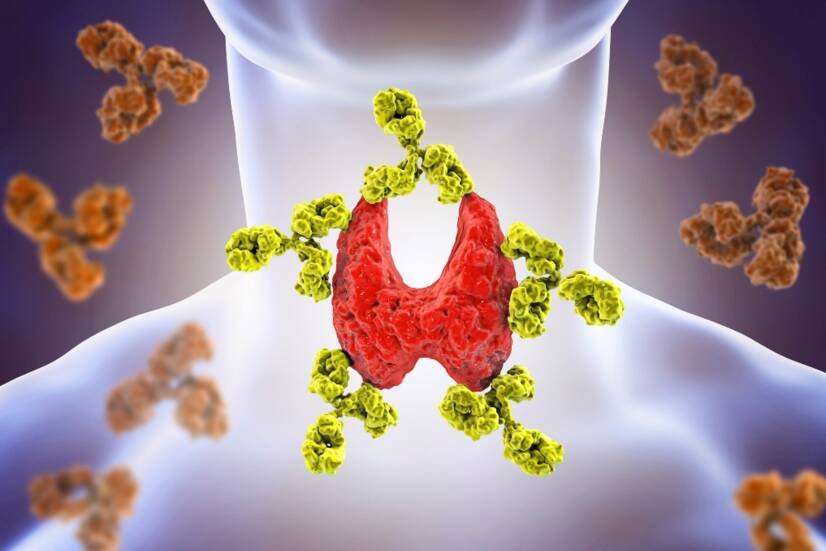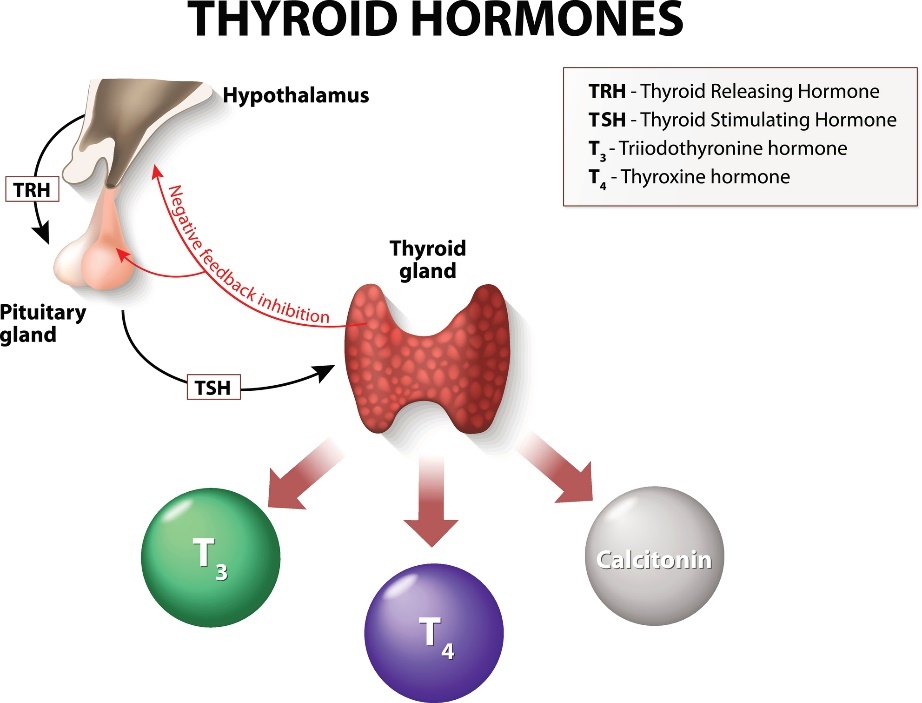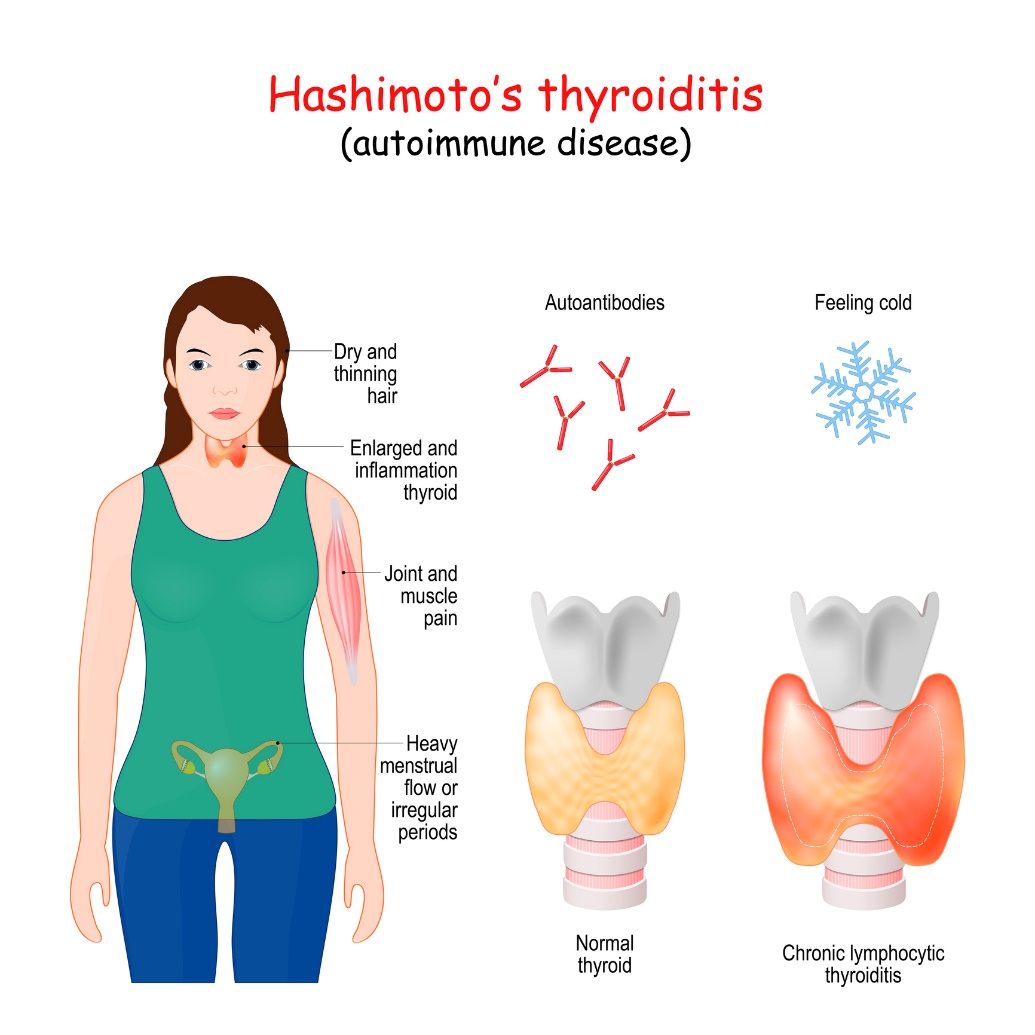- HÁNA, Václav. Endocrinology for practice. 2nd updated edition. Prague: Maxdorf, [2019]. Jessenius. ISBN 978-80-7345-625-2
- casopisvnitrnilekarstvi.cz - Chronic autoimmune thyroiditis and systemic connective tissue diseases. Ž. Macejová, K. Benhatchi, I. Lazúrová
- solen.sk - Thyreopathy in the general practitioner's outpatient clinic. Doc. MUDr. Soňa Kiňová, PhD., MUDr. Michal Koreň, PhD.
- healthline.com - Hashimoto's Thyroiditis. Healthline. Carmella Wint
Autoimmune thyroiditis: Hashimoto's disease. Causes, symptoms

Autoimmune thyroid disease affects approximately 5% of the population. The immune system attacks the thyroid gland itself. What are the causes, symptoms and treatment options for Hashimoto's thyroiditis?
Most common symptoms
- Muscle Pain
- Joint Pain
- Depression - depressed mood
- Gaining weight
- Excessive Hair Loss: Causes, Treatment
- Menstrual cycle disorders
- Dry skin
- Fatigue
- High blood pressure
- Constipation
Characteristics
Autoimmune thyroid disease involves an immune mechanism that attacks the cells of the thyroid gland. Chronic inflammation and poor gland function occurs.
What are the risk factors for developing it, etiology, symptoms, treatment options and much more, you will learn in the article.
The importance and function of the thyroid gland
The thyroid gland is an important small organ located at the front of the neck on the thyroid cartilage. It is made up of 2 lobes and resembles a butterfly in shape. The follicles of the lobes contain cells that produce thyroid hormones, thyroid hormones - triiodothyronine and thyroxine.
- Triiodothyronine contains 3 atoms of iodine and is abbreviated T3.
- Thyroxine contains 4 atoms of iodine and is therefore referred to as T4.
Thyroid hormones are involved in:
- Regulation of metabolism
- Oxygen consumption in the body
- Thermoregulation
- Growth and development
- Functioning of the nervous system
- Activity of the musculoskeletal system
- Cardiovascular activity
- Fertility and pregnancy
Another hormone produced by the thyroid gland is calcitonin with the task of regulating calcium and phosphorus in the blood.
For its proper function, the thyroid gland extracts iodine from the body, which it incorporates into thyroid hormones.
Thyroid function is regulated by the thyrotropin hormone TSH, which is produced by the adenohypophysis (anterior lobe of the pituitary gland). This in turn is regulated by the hypothalamus and TRH (thyrotropin releasing hormone). The thyroid gland is thus controlled by the central nervous system.

Hashimoto's thyroiditis
The disease occurs in 5% of the population. 80% of these are women.
The disease was discovered and described as early as 1912 by the Japanese physician Hasmitoto Hakaru.
Hashimoto's disease, also known as Hashimoto's thyroiditis, is a chronic autoimmune inflammation of the thyroid gland. The body's own immune system attacks the cells of the gland tissue. There is a gradual decrease in the activity and function of the gland.
A person's immune system evaluates some of the body's own parts as harmful or dangerous. In the case of Hashimoto's thyroiditis, this involves the production of antibodies against receptors and enzymes on the walls of the thyroid cells.
The result is chronic inflammation of the thyroid gland. The damaged thyroid gland is unable to perform its physiological function, resulting in a state of hypothyroidism (reduced thyroid function).
The disease is asymptomatic for a long time. The manifestations are mainly goiter (enlargement of the gland), weight gain, increased fatigue, muscle weakness, constipation, psychological problems and many others.
Causes
The exact mechanism and etiology of Hashimoto's thyroiditis are unknown. The disease is classified as an immunopathology, which is a Th-lymphocyte mediated disease. There is a loss of immunological tolerance to one's own tissue.
T-lymphocytes infiltrate the thyroid gland. They can activate macrophages, which are the source of cytotoxic T-lymphocytes involved in thyroid destruction.
The presence of lymphocytic infiltration is responsible for the production of antibodies against the thyroid gland. Therefore, the disease is also nicknamed as chronic lymphocytic thyroiditis.
Genetic predisposition is the leading risk factor for the development. However, it is not a prerequisite for the development. External factors also play a role.
Risk factors:
- Genetic predisposition
- Female sex
- Middle age
- Other autoimmune diseases
- Certain severe bacterial and viral infections
- Exposure to stress
- Exposure to radiation
- Deficiency of selenium, vitamin C and D
Symptoms
The development of the disease is usually gradual and slow.
There are many clinical symptoms associated with Hashimoto's thyroiditis, some of which may be indicative of other diseases, so a thorough diagnosis is necessary.
Initially, the disease may cause a brief hyperthyroidism (hashitoxicosis). The symptoms of autoimmune inflammation of the gland are both physical and psychological in nature.
The most common symptoms and manifestations:
- Weight gain
- Enlarged thyroid gland
- Feeling cold and chills
- Increased fatigue
- Muscle pain
- Joint pain and swelling
- Heart palpitations
- High blood pressure
- Constipation
- Hair thinning
- Dry skin
- Facial swelling
- Irregular menstruation
- Heavy menstruation
- Fertility disorders to infertility
- Depression

Diagnostics
Diagnosis of thyroid conditions consists of an endocrinological examination, which is often indicated by a general practitioner.
Primarily, a comprehensive medical history is taken from the patient in the form of an interview. The physician ascertains family history, diseases and diagnoses, medications taken, lifestyle, symptoms, and much more.
The doctor examines the thyroid gland, lymph nodes and the surrounding area by sight and palpation. He examines for any enlargement of the gland and the presence of nodules.
Diagnosis consists mainly of laboratory determination of the concentration of thyroid stimulating hormone, thyroxine and triiodothyronine and the presence of autoimmune antibodies from the patient's blood sample.
In a hypofunctioning thyroid gland, a decrease in thyroid hormones is characteristic. In contrast, TSH (thyrotropic hormone) produced in the pituitary gland is increased.
In a hyperfunctioning thyroid gland, the blood levels of the hormones T3 and T4 are increased.
Antibodies against the thyroid gland, typically thyroid peroxidase (TPO antibodies), are found in the blood. Thyroid peroxidase is a thyroid enzyme that plays an important role in the actual production of hormones.
The examination includes a surface ultrasound, which uses sound waves to show the internal structures of the gland tissue.
A biopsy of the thyroid tissue may be indicated, which involves taking a sample of the gland using a special thin biopsy needle and ultrasound. The sample of gland tissue is then sent to a laboratory for histological processing.
Thyroid scintigraphy involves the injection of a radioactive substance. Using a special scintillation camera that captures the radiation of the injected substance, a detailed image of the internal structures of the gland tissue can be created.
Health risks of untreated Hashimoto's thyroiditis
In addition to the characteristic clinical symptoms such as weight gain, fatigue, muscle and joint pain or constipation and many others, untreated autoimmune thyroiditis can cause serious health problems.
The risk is goiter (enlargement of the thyroid gland), which causes health problems with swallowing or breathing difficulties.
Hashimoto's inflammation is often associated with cardiovascular disease due to elevated blood pressure and LDL cholesterol.
Psychological problems, such as depression or anxiety, are a common result of clinical symptoms.
Myxedema coma is a serious, life-threatening condition that can occur with long-term untreated hypothyroidism. The provoking factors are mainly infections or other excessive stresses on the body.
Myxedema coma is initially manifested by decreased body temperature, chills, slowed breathing, increased fatigue and sleepiness. This eventually results in unconsciousness to coma itself.
Birth defects and developmental disorders in children of mothers with untreated Hashimoto's hypothyroidism have a higher risk of occurrence.
A possible association between pregnancy with untreated hypothyroidism and the occurrence of cleft palate or heart, brain and kidney disorders in children has been suggested.
Diet in hypothyroidism
Since thyroid hypofunction can be caused by many reasons, it is advisable to consult a physician and possibly a nutritionist for dietary advice.
Due to Hashimoto's possible initial hyperthyroidism, subsequent hypothyroidism, the progression of the disease and the patient's medical condition, the diet should be consulted with a physician.
The thyroid gland needs iodine to produce sufficient thyroid hormones. Therefore, it is advisable to consume adequate amounts of iodine. However, not excessive amounts. Good sources are fish, eggs or seaweed.
Selenium and zinc are important elements for thyroid metabolism. They are mainly found in whole grain products, legumes, meat or fish. Vegetables (parsley, carrots, celery), fish, olive oil, avocados, fruits and seeds and nuts are also good sources.
Patients with hyperthyroidism are advised to pay attention to regularity in diet, sufficient intake of protein, vitamins and minerals (calcium, magnesium, selenium and zinc).
Excessive consumption of soy products is not recommended for hypothyroid patients, as it may adversely affect the function and activity of thyroid hormones.
Strumigens (a substance that increases the risk of goiter) are best eaten in moderation. They include broccoli, kohlrabi, cauliflower, kale, cabbage, soybeans, corn, beans, barley, mustard seed and canola.

How it is treated: Autoimmune thyroiditis - Hashimoto's disease
Treatment options for Hashimoto's disease: drugs, hormones to surgery
Show moreAutoimmune thyroiditis is treated by
Other names
Interesting resources










